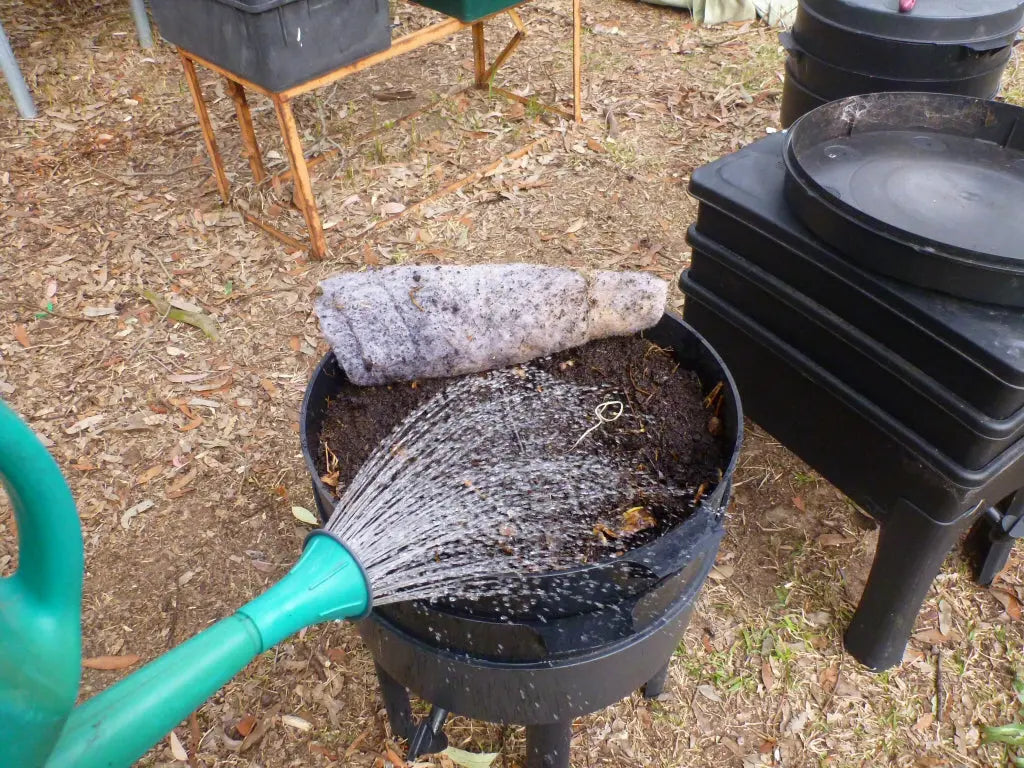Worm composting, also known as vermicomposting, is a great way to turn kitchen scraps and other organic waste into nutrient-rich compost for your plants. However, one of the key components to successful worm composting is maintaining the correct moisture level in your worm bin.
The ideal moisture for your worm bin
The ideal moisture level for a worm bin is between 60-70%. This level of moisture allows the worms to move and breathe easily, while also providing the right environment for the microorganisms that help break down the organic matter. If the moisture level is too high, the bin can become anaerobic, which can lead to bad odors and the growth of harmful bacteria. On the other hand, if the moisture level is too low, the worms can become stressed and may die.
How to check the moisture levels in your worm bin
There are a few simple ways to check the moisture level in your worm bin. One method is to take a handful of the compost and squeeze it. If a few drops of water come out, the moisture level is about right. If water drips out, the bin is too wet. If no water comes out, the bin is too dry. Another method is to stick a moisture meter into the compost to get a more precise reading. However the squeeze test is the more accurate way to test for moisture.
Must Read : What Do Mealworms Eat? The Complete Guide to Mealworm Diet, Care, and Survival
What to do if your worm bin falls out of the ideal moisture level
Bin is too wet:
If your bin is too wet, there are a few things you can do to fix the problem. First, make sure that you are not adding too much water to the bin. Worms do not need to be watered like plants do, and adding too much water can lead to a wet, smelly bin. Instead, you can add more dry materials like shredded newspaper or straw to absorb the excess moisture.
Another tip is to add more worms to the bin. The worms will help break down the organic matter and absorb some of the excess moisture. Adding more worms will also help to speed up the decomposition process, as they will consume more of the organic matter in the bin. Additionally, you can add more air to the bin by stirring the compost or adding air holes to the bin. This will help to dry out the bin and reduce the chances of anaerobic conditions.
Best tip is to always add shredded cardboard or paper under each feeding of scraps to soak up excess water being released during decomposition.
Bin is too dry:
If your bin is too dry, you can add water to the bin to bring the moisture level up. However, be careful not to add too much water at once as this can cause the bin to become too wet. You can also add more moist materials like fresh fruits and vegetables to the bin. The moisture from these materials will help bring the moisture level up. Be careful not to overfeed or you will just make another issue with moisture.

Additional tip:
Another way to control the moisture level in your worm bin is by monitoring the temperature inside the bin. Worms are sensitive to temperature changes, and if the bin gets too hot, the worms can die. The ideal temperature range for worm composting is between 65-78°F. You can use a thermometer to check the temperature inside the bin. If the temperature is too high, you can add frozen water bottles to the bin to cool it down. If the temperature is too low, you can add more dry materials to the bin to raise the temperature.
Click here to get your very own Memes Worms Thermometer...
Do Worms Need Water? Understanding Moisture for Healthy Vermicomposting
Worms don’t drink water the way humans or pets do — instead, they absorb moisture through their skin, which helps them breathe and stay active. This means yes, worms do need water, but in the right amount. Too much water in the worm bin reduces oxygen and creates anaerobic conditions, while too little water dries out their skin and can slow or even stop the composting process.
For red wigglers and other composting worms, moisture acts like their “air supply,” so maintaining the correct level is one of the most important parts of vermicomposting.
Ideal Vermicompost Moisture Content (Why It Matters)
The perfect vermicompost moisture content sits around 60–70%, which feels like a damp, well-wrung-out sponge. At this level:
- Microorganisms break down waste efficiently
- Worms can move freely and breathe properly
- The compost stays aerated without becoming muddy
- Bad smells and pests stay under control
Moisture below 50% slows decomposition, while moisture above 75% can suffocate worms and cause foul odours. Monitoring this balance keeps your vermicompost output rich, airy, and nutrient-dense.
How Much Water Should You Add to a Worm Bin?
Beginners often ask how much water a worm bin needs. The truth is: worm bins rarely need direct watering. Most moisture comes naturally from fruit and vegetable scraps.
Only add water when:
- Bedding feels dry or crumbly
- Worms gather in a corner to find moisture
- The squeeze test shows no water at all
If the bin is too dry, start by sprinkling ½ cup of water evenly across the bedding for a medium-sized bin, mix gently, and check again in a few hours. Always add water slowly — it’s easier to increase moisture than to fix an overly wet bin later.
To prevent future dryness:
- Add moist bedding (soaked & squeezed newspaper/cardboard)
- Cover the top with a breathable, damp cloth
- Avoid overfeeding dry materials
Must Read : What Are The Different Types of Nightcrawler Worms?
Conclusion
In summary, maintaining the correct moisture level in your worm bin is crucial for the health of your worms and the success of your composting. The ideal moisture level is between 60-70%, and you can check the moisture level using a few simple methods. If the bin is too wet, you can add more dry materials and worms to absorb the excess moisture. If the bin is too dry, you can add water and moist materials to bring the moisture level up. Additionally, monitoring the temperature inside the bin can also help control the moisture level. With a little care and attention, you can ensure that your worm bin is producing high-quality compost for your plants.




2 comments
peter
Hi,
I just received a shipment from Meme’s and everything seemed OK. But lately, I have seen a huge number of fly larvae (maggots) in my bin. How can I get rid of them without endangering my worms? I have a burlap blanket over the bin’s contents and the bin itself is fly proof, so I am not sure just where these maggots came from. Any suggestions will be much appreciated.
Thank you,
Peter
Al Fyfe
Great information. I’m going to print it and pass it along when I give away a starter worm bin.
Leave a comment
All comments are moderated before being published.
This site is protected by hCaptcha and the hCaptcha Privacy Policy and Terms of Service apply.